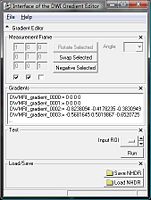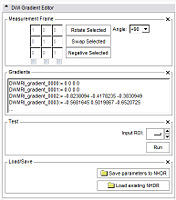Difference between revisions of "Slicer3:Diffusion Editor"
From NAMIC Wiki
m |
m |
||
| Line 20: | Line 20: | ||
## If there is no information about the gradients, the GE gradients will be displayed by default. | ## If there is no information about the gradients, the GE gradients will be displayed by default. | ||
## You can copy/paste your own gradients in the text field. | ## You can copy/paste your own gradients in the text field. | ||
| − | #'''Run test'''. To see if the chosen parameters are reasonable, you can run a test that computes the Tractography Seeding. | + | #'''Run test'''. |
| + | ## Add a ROI label map. To see if the chosen parameters are reasonable, you can run a test that computes the Tractography Seeding. | ||
#'''Save''' the parameters as a NHRD File. | #'''Save''' the parameters as a NHRD File. | ||
#'''Load''' an existing NHRD File and run the test. | #'''Load''' an existing NHRD File and run the test. | ||
== How to use the editor == | == How to use the editor == | ||
Revision as of 21:30, 5 December 2007
Home < Slicer3:Diffusion EditorInterface
This screen shots show how the Interface will look like.
- Interface
Goals / What it can (in a while)
- Load a DWI dataset. If you load any other type of dataset the DWI Gradient Editor will be disabled.
- Choose Measurement Frame.
- Negative: Select the columns you want to negative.
- Swap: Select two columns you want to swap.
- Rotate: Select one column you want to rotate by an angle you can
- choose from a given set of values.
- set yourself.
- Define Gradients.
- If the DICOM header has the information about the gradients, the editor will put them in the text field.
- If there is no information about the gradients, the GE gradients will be displayed by default.
- You can copy/paste your own gradients in the text field.
- Run test.
- Add a ROI label map. To see if the chosen parameters are reasonable, you can run a test that computes the Tractography Seeding.
- Save the parameters as a NHRD File.
- Load an existing NHRD File and run the test.

